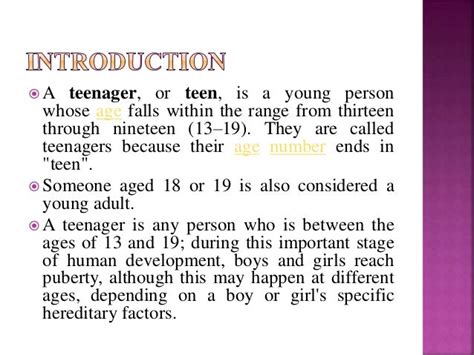The question of whether 13 is considered a teenager is a common debate among parents, educators, and the general public. To provide a comprehensive answer, let's explore the definition of a teenager and the various stages of adolescence.
Defining Adolescence
Adolescence is a stage of human development that occurs between childhood and adulthood. It is characterized by significant physical, emotional, and social changes. The World Health Organization (WHO) defines adolescence as the period between 10 and 19 years of age.
Stages of Adolescence
Adolescence is often divided into three stages:
- Early adolescence: 10-13 years old
- Middle adolescence: 14-16 years old
- Late adolescence: 17-19 years old
These stages are not rigidly defined and can vary depending on individual development and cultural contexts.
Is 13 Considered a Teenager?
Considering the definition of adolescence and its stages, 13 is indeed considered a teenager. At 13, an individual is in the early stages of adolescence, experiencing significant physical, emotional, and social changes.
Here are some reasons why 13 is considered a teenager:
- Physical changes: At 13, individuals are undergoing rapid physical changes, including the onset of puberty, growth spurts, and changes in body composition.
- Emotional changes: Early adolescence is marked by emotional changes, including mood swings, increased sensitivity, and a growing sense of independence.
- Social changes: Thirteen-year-olds are forming close relationships with peers, exploring their identities, and developing social skills.
While 13 is considered a teenager, it's essential to remember that individual development can vary significantly. Some 13-year-olds may be more mature or less mature than their peers, and that's okay.
What Does It Mean to Be a Teenager?
Being a teenager encompasses a wide range of experiences, emotions, and challenges. Teenagers are in a state of rapid growth and development, navigating complex social relationships, academic pressures, and emotional turmoil.
As a teenager, an individual is:
- Developing their identity and sense of self
- Forming close relationships with peers and family members
- Exploring their interests and passions
- Navigating academic and extracurricular challenges
- Managing emotional changes and mood swings
In summary, 13 is indeed considered a teenager, marking the beginning of a significant stage of human development characterized by physical, emotional, and social changes.

Conclusion
Being a teenager is a complex and dynamic experience, marked by significant growth, exploration, and self-discovery. As a society, it's essential to support and guide teenagers through these challenges, providing them with the resources, guidance, and understanding they need to thrive.
We hope this article has provided valuable insights into the question of whether 13 is considered a teenager. If you have any further questions or concerns, please don't hesitate to comment below.






What is the definition of adolescence?
+Adolescence is a stage of human development that occurs between childhood and adulthood, characterized by significant physical, emotional, and social changes.
What are the stages of adolescence?
+Adolescence is divided into three stages: early adolescence (10-13 years old), middle adolescence (14-16 years old), and late adolescence (17-19 years old).
What are the characteristics of a teenager?
+Teenagers are in a state of rapid growth and development, navigating complex social relationships, academic pressures, and emotional turmoil.
